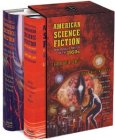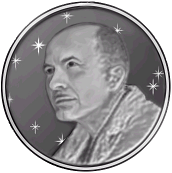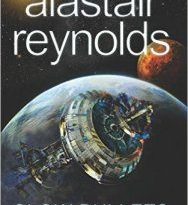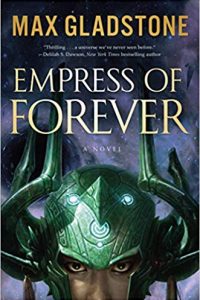Russell Letson reviews American Science Fiction: Nine Classic Novels of the 1950s
 The Library of America’s American Science Fiction: Nine Classic Novels of the 1950s was edited by my Locus colleague Gary K. Wolfe, but I would have good things to say about it even if the project had been overseen by Anon instead of a friend and fellow ink-stained wretch. The two volumes of this boxed set offer a high-altitude view of long-form SF over a six-year stretch of the titular decade: the 1953-56 volume includes Frederik Pohl & C.M. Kornbluth’s The Space Merchants, Theodore Sturgeon’s More Than Human, Leigh Brackett’s The Long Tomorrow, and Richard Matheson’s The Shrinking Man; from 1956-58 we get Robert Heinlein’s Double Star, Alfred Bester’s The Stars My Destination, James Blish’s A Case of Conscience, Algis Budrys’ Who?, and Fritz Leiber’s The Big Time.
The Library of America’s American Science Fiction: Nine Classic Novels of the 1950s was edited by my Locus colleague Gary K. Wolfe, but I would have good things to say about it even if the project had been overseen by Anon instead of a friend and fellow ink-stained wretch. The two volumes of this boxed set offer a high-altitude view of long-form SF over a six-year stretch of the titular decade: the 1953-56 volume includes Frederik Pohl & C.M. Kornbluth’s The Space Merchants, Theodore Sturgeon’s More Than Human, Leigh Brackett’s The Long Tomorrow, and Richard Matheson’s The Shrinking Man; from 1956-58 we get Robert Heinlein’s Double Star, Alfred Bester’s The Stars My Destination, James Blish’s A Case of Conscience, Algis Budrys’ Who?, and Fritz Leiber’s The Big Time.
It would be silly to review the novels themselves – though I will have a few comments later on – but the value and usefulness of the set is worth talking about. The first impression of the physical package is that the books are handsome, well-made, and surprisingly compact, given the doorstop-spec, 800-plus-per-volume page count. The texts have been vetted, corrected, and reset rather than just photo-offset reproduced from existing editions, and the dust jacket and box art are period-appropriate – Richard Powers’s covers for the Ballantine Books edition of Childhood’s End and the Crest Books anthology 3 From Out There and Ralph Brillart’s cover for the Ballantine A Plague of Pythons. (That last one is actually a 1965 book, but the painting still has that ’50s vibe.)
This was a period when the SF novel was still a creature of the magazines, and all but the Matheson and Brackett first appeared as serials or shorter magazine versions rather than as original books. I know this fact and many others because this set is not just a Greatest Hits of the ’50s (As Seen On TV) thrown together, but carefully selected, prepared, and annotated by Wolfe and the LoA staff. The back matter of each volume offers biographical notes, notes on the texts, and plain old notes. The last of these not only explain obscure references but include, for example, chapters of The Space Merchants previously published only in the Galaxy serialization and introductory pieces written by Matheson, Blish, and Leiber for various later editions of their novels. There is also a website (www.loa.org/sciencefiction/) with ancillary material – Wolfe’s essay ‘‘Why the 1950s?’’ (which would have made a nifty introduction to the printed set); appreciative essays on the novels by William Gibson, Kit Reed, Peter Straub, and Connie Willis, among others; two previously published essays about the period, Robert Silverberg’s ‘‘Science Fiction in the Fifties: The Real Golden Age’’ and Barry Malzberg’s ‘‘The Fifties’’; plus a gallery of magazine and book cover art for earlier appearances of the works.
I suppose one question might be the audience or market for this set. Some of the titles have been in print often enough that they are not rarities, and many enthusiasts will have already read them – indeed, those of A Certain Age, such as the set’s editor and this reviewer, have probably read them several times over the span of a half-century or more. My immediate reaction was that one could build an intermediate-to-advanced college course around these titles – I would have embraced these volumes enthusiastically when I was trying to maintain a stable reading list for my courses. The texts are well chosen, the scholarly impedimenta are in place, and while a full survey of American SF of the 1950s would require a collection of short fiction, the long-form part would be well served by these novels. (And the volumes can be purchased separately, which would make course design more flexible and affordable.) Then there’s the standard-or-canonical-texts market – every research or comprehensive library should have these titles on their shelves, and this set has the virtues of solid scholarly preparation and physical sturdiness. (I believe that is the first time I have recommended a book on the latter grounds.)
And while it is an exercise in redundancy to evaluate the novels themselves – let alone second-guess the selections – I have to say that this is about as good a sample of ’50s SF as one could ask. I was particularly pleased to see The Stars My Destination and More Than Human make the cut, because when those novels and I were contemporaries they were touchstone works for me. (Come to think of it, they still are.) And now they and the other seven novels have a chance of staying on the shelves for another 50 years or more.







The Library of America link you want is http://www.loa.org/sciencefiction/
Thanks.